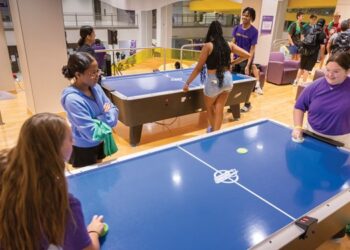Intramurals are no longer relegated to just a football field or basketball court. Video game tournaments — known as esports — are a growing trend in campus recreation, and it’s become more common to see college students holding a controller instead of a ball in their free time.
“Esports is rising in popularity everywhere,” said Sean Monnier, the manager of intramural sports and sport clubs at the University of Utah. “The goal of campus recreation is to create healthy lifestyles and healthy habits for lifelong happiness, and all sports and games are a way for students to develop support systems and strong bonds with their peers.”
In fact, Monnier believes students can experience the same positive effects through esports as they can through traditional sports. “It turns out cooperative and competitive video games develop strong bonds in a similar manner as they do on the basketball courts and rugby fields,” he said.
Because video games are such a common hobby, Utah embraced the trend and started its own varsity esports team in 2017. The biggest hurdle Monnier had to leap when starting this program was getting buy-in from the department’s key decision-makers.
“Convincing your supervisor you need to purchase the latest and greatest consoles, and the games that come with them, is going to be a big challenge,” said Monnier. “Those systems are not cheap and having to update your games yearly, just to keep up, can add up.”
Monnier found success in promoting the benefits of esports for students’ social well-being on Utah’s campus. As a result, esports has been especially useful in driving participation from students who would have otherwise been non-users of the recreation center. “The students who participate in our esports programs are sometimes those who would never step foot in a gym or play ‘regular’ sports,” explained Monnier.
Once new students are in the rec center and plugged into the esports programs, the competition gets fierce. “The tournaments we hold are intense,” said Monnier. “Many of these students live and breathe Madden and FIFA, playing it after class just to unwind. We have upwards of 40 participants on a night, vying for a chance to take home a T-shirt and copy of their game’s newest version.”
As crazy as it may sound, esports can be just as competitive as regular sports, according to Monnier. “In many ways, the intensity of these tournaments can rival that of an intramural championship game,” he said.
If you want to integrate esports in your rec center, but don’t know where to start, talk to your student staff. “I can almost guarantee someone within your student staff owns a new generation of consoles,” said Monnier. “And I bet that student has games to go with it. Have a staff tournament night in the facility, so students can bring their favorite games to play with their peers.”
Simply put, it’s worth investing in this growing industry. “We need to keep up with the trends and activities that are popular with our students,” said Monnier. “By listening to them and getting their input, we can provide the games they want to play and the space necessary to help them create the support and connections they need with their peers.”










